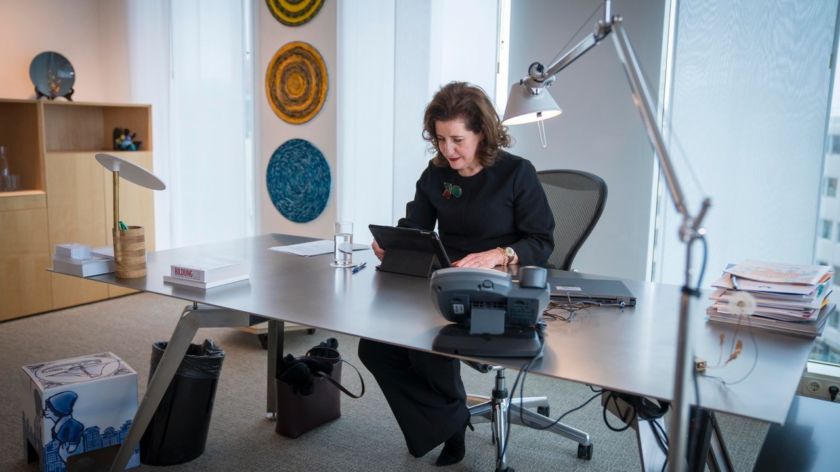Minister of Education’s Letter to Parliament both praised and criticised
-
 Ingrid van Engelshoven in her office at the ministry. Photo: Erik van 't Hullenaar
Ingrid van Engelshoven in her office at the ministry. Photo: Erik van 't Hullenaar
The view on internationalisation taken by Dutch Minister of Education Ingrid Van Engelshoven has sparked conflicting reactions at Radboud University. Astronomer Paul Groot fully agrees with the document, but Dutch language expert Lotte Jensen regrets that the definition of ‘internationalisation’ is again limited to the increasing use of English.
In a letter to the Lower House that was published today, Minister Ingrid van Engelshoven explained how internationalisation contributes to the quality of higher education. She also addressed the negative signals that this matter continues to elicit.
The minister is a great advocate of internationalisation. “By learning international competences, students are better qualified for an increasingly global job market. The benefits aren’t just limited to the student who wants to go abroad.” The minister also pointed to the additional value of attracting and retaining international talent for the Dutch knowledge economy.
The Higher Education Act states that lectures are to be given in Dutch unless another language is necessary. The minister has proposed a legal amendment: institutions should be allowed to offer programmes in a foreign language if this add value and if the interest of Dutch students is taken into account.
‘English is inherent to high-quality education’
However, the minister added that internationalisation should never be a goal in and of itself. “The core emphasis is not on more or less, but on a qualitative answer to the issues related to internationalisation. I take the existing concerns seriously.”
In her policy document, the minister also voiced support for the measures proposed by the Association of Universities in the Netherlands (VSNU) and the Netherlands Association of Universities of Applied Sciences (VH) in their internationalisation agenda to channel the influx of international students where necessary, such as a numerus fixus for an English-language track of a programme.
World stage
How Radboud University will respond to the minister’s policy document remains to be seen: the new internationalisation agenda will be discussed by the participational councils later this month. But it is already clear that the university has both supporters of and opponents to the minister’s view.
Professor of Astronomy Paul Groot completely agrees. “I was recently disappointed by the internationalisation agenda of the VSNU and the VH in which they wanted to stop the number of international students. And BON’s legal case against too much English in higher education is simply too ridiculous for words.”
‘It will be even easier to create programmes in English’
According to Groot, we must offer international, high-quality education if the Netherlands hopes to maintain its prosperity. “English-language education is inherent to this. In physics and astronomy, 70 percent of the PhD candidates now come from abroad and they often remain here after their studies. We need this if we want to play a part on the world stage.”
Chameleon advice
Professor of Dutch Cultural and Literary History Lotte Jensen holds a completely different view. She referred to Van Engelshoven’s letter as chameleon advice. “The minister said: English is allowed if it adds value. This makes it again easier to create programmes in English. But the minister also said that there will always be room for Dutch students and that a sufficient number of programmes in Dutch will be offered. I don’t see how those two elements go together.”
Jensen regrets that, in the minister’s letter, the term ‘internationalisation’ is again limited to the use of English, thus eliminating the added value of multilingualism. “It is also unclear how the minister wants to retain Dutch as a language for the humanities.”
According to Jensen, Van Engelshoven’s letter mirrors the internationalisation agenda of the VSNU too closely. Jensen recently expressed two major objections to this in the NRC: the view on language policy and language skills is too limited in the document, and strong economic issues underlie the agenda. “This also holds true for the minister’s letter.”



